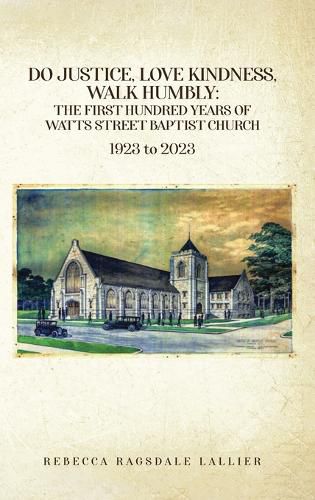Readings Newsletter
Become a Readings Member to make your shopping experience even easier.
Sign in or sign up for free!
You’re not far away from qualifying for FREE standard shipping within Australia
You’ve qualified for FREE standard shipping within Australia
The cart is loading…






This title is printed to order. This book may have been self-published. If so, we cannot guarantee the quality of the content. In the main most books will have gone through the editing process however some may not. We therefore suggest that you be aware of this before ordering this book. If in doubt check either the author or publisher’s details as we are unable to accept any returns unless they are faulty. Please contact us if you have any questions.
In 1923, a group of Baptists in Durham, North Carolina came together to make a new church, Watts Street Baptist church. They build their church in a downtown neighborhood next door to Trinity College, soon to become Duke University. In its early years, with budget woes and the Great Depression, the church struggled. But eventually, as the neighborhood flourished and the university grew, so did the church. It had its own version of town and gown controversy, but the congregation came together to build a solid reputation for its work in social justice and its liberal views.
A predominantly White church, Watts Street remained open to Black people from at least the 1940s. Interracial meetings were hosted regularly. In 1963, the church ordained the Reverend Addie Daivs, the first woman ordained in the Southern Baptist Convention. In 2009, the congregation adopted a formal statement welcoming all, regardless of sexual orientation or identity.
Watts Street pastors have been dedicated, articulate leaders, who have not hesitated to take unpopular stands. In 2014, the church called the Reverend Dorisanne Cooper to serve as its first woman senior pastor. The church's focus on mission over evangelism and individuals over doctrine have led it out of the SBC and other Baptist organizations and into relationships with the Alliance of Baptists and the Association of Welcoming and Affirming Baptists.
As it enters into its next hundred years, Watts Street plans to keep listening for the radical Spirit of God, ready to step out in faith and love.
$9.00 standard shipping within Australia
FREE standard shipping within Australia for orders over $100.00
Express & International shipping calculated at checkout
This title is printed to order. This book may have been self-published. If so, we cannot guarantee the quality of the content. In the main most books will have gone through the editing process however some may not. We therefore suggest that you be aware of this before ordering this book. If in doubt check either the author or publisher’s details as we are unable to accept any returns unless they are faulty. Please contact us if you have any questions.
In 1923, a group of Baptists in Durham, North Carolina came together to make a new church, Watts Street Baptist church. They build their church in a downtown neighborhood next door to Trinity College, soon to become Duke University. In its early years, with budget woes and the Great Depression, the church struggled. But eventually, as the neighborhood flourished and the university grew, so did the church. It had its own version of town and gown controversy, but the congregation came together to build a solid reputation for its work in social justice and its liberal views.
A predominantly White church, Watts Street remained open to Black people from at least the 1940s. Interracial meetings were hosted regularly. In 1963, the church ordained the Reverend Addie Daivs, the first woman ordained in the Southern Baptist Convention. In 2009, the congregation adopted a formal statement welcoming all, regardless of sexual orientation or identity.
Watts Street pastors have been dedicated, articulate leaders, who have not hesitated to take unpopular stands. In 2014, the church called the Reverend Dorisanne Cooper to serve as its first woman senior pastor. The church's focus on mission over evangelism and individuals over doctrine have led it out of the SBC and other Baptist organizations and into relationships with the Alliance of Baptists and the Association of Welcoming and Affirming Baptists.
As it enters into its next hundred years, Watts Street plans to keep listening for the radical Spirit of God, ready to step out in faith and love.